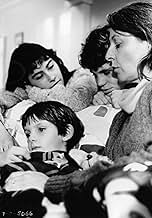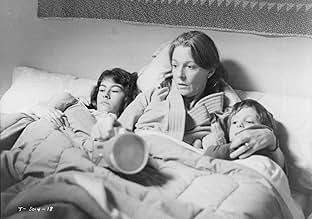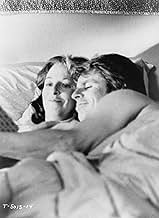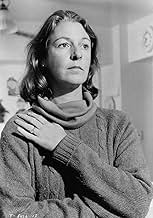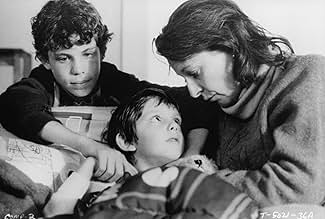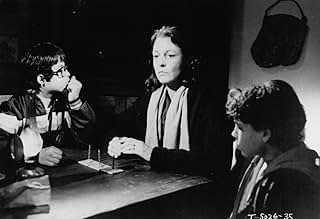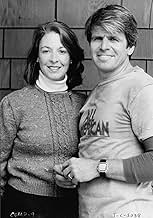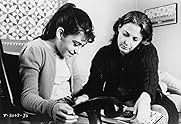IMDb RATING
6.9/10
7.7K
YOUR RATING
The life of a suburban American family is scarred after a nuclear attack.The life of a suburban American family is scarred after a nuclear attack.The life of a suburban American family is scarred after a nuclear attack.
- Director
- Writers
- Stars
- Nominated for 1 Oscar
- 2 wins & 6 nominations total
Rossie Harris
- Brad Wetherly
- (as Ross Harris)
William G. Schilling
- Pharmacist
- (as William Schilling)
- Director
- Writers
- All cast & crew
- Production, box office & more at IMDbPro
6.97.7K
1
2
3
4
5
6
7
8
9
10
Featured reviews
Dad leaves for work and everything goes to hell
I've seen this movie twice, and "Testament" still lingers in my brain as an atom bomb movie. And it's not really about that - the bomb comes and goes fairly quickly - but more about how a community comes together during the aftermath. It's kinda funny how the movie flips from TV commercial suburban life to sobering angst, where precious resources are rationed and then dry up completely.
But it is a powerful movie, thanks largely to the characters and the performances. Even as death loiters nearby and the losses keep piling up (god, this movie just keeps taking), there's Jane Alexander hanging on til the bitter end. Despite the climate of that period in the early '80s, subtlety is really this movie's strong suit. Characters die off, one by one, but it's never staged or theatrical. Very subdued; we'll just get a single image and put the horrifying pieces together.
It's kinda hard to believe there's a (tiny) ray of hope at the end of this thing. But man, it's a punishing journey.
7/10
But it is a powerful movie, thanks largely to the characters and the performances. Even as death loiters nearby and the losses keep piling up (god, this movie just keeps taking), there's Jane Alexander hanging on til the bitter end. Despite the climate of that period in the early '80s, subtlety is really this movie's strong suit. Characters die off, one by one, but it's never staged or theatrical. Very subdued; we'll just get a single image and put the horrifying pieces together.
It's kinda hard to believe there's a (tiny) ray of hope at the end of this thing. But man, it's a punishing journey.
7/10
A small, brilliant gem of a film that still holds up after 20 years
I first saw "Testament" when it came out in 1983. At the time, I was 30 years old and the mother of a two year-old son. As a child of the Cold War years, I have always been interested in films about that most unthinkable event: the detonation of a nuclear bomb or bombs somewhere on our fragile planet. If you are, too, you must watch "Testament" (and another small gem of a slightly earlier era called "Fail-Safe.")
This is a wonderful film that slowly, unbearably reveals what happens in the small, idyllic town of Hamlin after a full-scale nuclear exchange between the superpowers wipes out a large part of America. The town and its citizens, including the Weatherly family, escape initial destruction. But slowly the bonds that hold western societies together (electricity, communication, fresh food, medical help) begin to fray and ravel. There is no television. Batteries to power transistor radios suddenly become more valuable than $20 bills in a town where, suddenly, there's nothing left to buy.
The story and scenes are permeated with a sense of enormous loss. A family loses its husband and father who simply walked out the door, waving a breezy goodbye one morning, and disappeared into the holocaust. All his wife, Carol, and two children have left of him are their memories and some flickering images on home movies, glimpses not just of a lost loved one, but of a lost -- and loved -- world.
A school play about the Pied Piper was in rehearsal before catastrophe hit, and, desperate to recapture some normalcy and to divert the children's attention from a reality to horrible to contemplate, the town decides to go on with the show.In the earlier rehearsal scenes, life was normal, the future shone brightly in the children's faces. Now, as the parents watch the performance, they see no future for these beautiful innocents. To me, this is the key scene of the film: the contrast between what these people once had and what has been lost is staggering. It makes you want to go outside, smell the air, marvel at the full supermarket shelves and the working telephone lines. (This is a gift that the movie gives its audience which goes far beyond entertainment and approaches enlightenment.)
Beyond the wonderful writing, direction and performances, I love the tiny touches in the story. For example, there's the foreshadowing, the implicit warning contained in the presence of a minor character, a little Japanese boy with Down Syndrome who is cared for by the town after his father dies. The child's name is Hiroshi. Pay attention, the script commands us in a whisper: Hiroshima happened once, but it can happen again, and it can happen to you as well as "them."
In the end, the movie is a testament to this undeniable fact, a testament to the stupidity of men who continue building ever-larger, more lethal means of mass destruction, and finally, a testament to the strength of mothers like the character of Carol Weatherly who have no choice but to love and protect their children no matter what comes.
This is a wonderful film that slowly, unbearably reveals what happens in the small, idyllic town of Hamlin after a full-scale nuclear exchange between the superpowers wipes out a large part of America. The town and its citizens, including the Weatherly family, escape initial destruction. But slowly the bonds that hold western societies together (electricity, communication, fresh food, medical help) begin to fray and ravel. There is no television. Batteries to power transistor radios suddenly become more valuable than $20 bills in a town where, suddenly, there's nothing left to buy.
The story and scenes are permeated with a sense of enormous loss. A family loses its husband and father who simply walked out the door, waving a breezy goodbye one morning, and disappeared into the holocaust. All his wife, Carol, and two children have left of him are their memories and some flickering images on home movies, glimpses not just of a lost loved one, but of a lost -- and loved -- world.
A school play about the Pied Piper was in rehearsal before catastrophe hit, and, desperate to recapture some normalcy and to divert the children's attention from a reality to horrible to contemplate, the town decides to go on with the show.In the earlier rehearsal scenes, life was normal, the future shone brightly in the children's faces. Now, as the parents watch the performance, they see no future for these beautiful innocents. To me, this is the key scene of the film: the contrast between what these people once had and what has been lost is staggering. It makes you want to go outside, smell the air, marvel at the full supermarket shelves and the working telephone lines. (This is a gift that the movie gives its audience which goes far beyond entertainment and approaches enlightenment.)
Beyond the wonderful writing, direction and performances, I love the tiny touches in the story. For example, there's the foreshadowing, the implicit warning contained in the presence of a minor character, a little Japanese boy with Down Syndrome who is cared for by the town after his father dies. The child's name is Hiroshi. Pay attention, the script commands us in a whisper: Hiroshima happened once, but it can happen again, and it can happen to you as well as "them."
In the end, the movie is a testament to this undeniable fact, a testament to the stupidity of men who continue building ever-larger, more lethal means of mass destruction, and finally, a testament to the strength of mothers like the character of Carol Weatherly who have no choice but to love and protect their children no matter what comes.
Powerful, gripping look at nuclear hell
1983..The cold war was in full swing and the fear of nuclear armageddon hung over all our heads. ABC released "The Day After", (which I have already commented on) but in all the furor around that, "Testament" was released. This is THE 1980's nuclear war film. It doesn't deal with the effects on an entire community, but rather on one small, close knit family in California. Jane Alexander's performance was one of legend, and is possibly one of the classic dramatic performances of all time. The day begins innocently enough, dad heads off to work, the kids watch "Sesame Street"..then the Emergency Broadcast System cuts in and the world stops. Ignore all the Y2K mumbo-jumbo and put yourself back in 1983 (most of us know where we were) and watch this film. You may not be "entertained", but you will appreciate what you have just a bit more.
I'm in serious need of antidepressants after seeing this film!
I've been a fanatic of disaster movies and post-apocalypse Sci-Fi for practically my entire life already, but I have deliberately been avoiding the actual "nuclear bomb impact" films. There were several of these released during the early 80's. Apart from "Testament", there's also "The Day After", "Threads", "Letters from a Dead Man" and "When the Wind Blows". All these aforementioned films have high ratings, favorable reviews and impeccable cult-reputations. So, then why haven't I seen them before? Because the impact of these films, pretty much like the H-bomb itself, is downright devastating, and yours truly is a very sensitive person!
There's a world of difference between sci-fi films set in post-nuclear wastelands, where a handful of human survivors drive around in dune buggies and battle each other over a tank of fuel, and actually witnessing the long and excruciatingly painful process which leads to the complete extinction of mankind. And even though writer Carol Amen and director Lynne Littman absolutely restrain from turning "Testament" into a sentimental tearjerker, the film is inescapably harrowing, and numerous sequences caused me to burst into tears.
The story takes place in the peaceful little community of Hamlin, a suburb of San Francisco, and introduces the model family of Tom and Carol Wetherly and their three children. Everything they love and worked for literally vanishes in a bright and sudden flash. Hamlin's unusual geographical location, in a sort of mountain bowl, safeguards the town from instantaneous destruction, but this rapidly proves to be a curse instead of a blessing. Without any form of sensationalism, or raising idle hope, Littman depicts how the townspeople and loved ones succumb around Carol, whilst radio contact with the rest of the world fades even further away.
The aptly titled "Testament" is a beautiful, frustrating, haunting, infuriating and noble film all at once. The performances are stellar, and the use of music is staggering. The only remote default, according to me, isn't even a shortcoming in the film itself. I find it unjust that so many people must emphasize in their reviews that "Testament" was directed by a woman, and hence make the film somewhat of a monument of feminism. As far as I'm concerned, gender equality is incontrovertible, and women are just as skilled and talented as directors as males. Lynne Littman did a fantastic job as a director; - period!
There's a world of difference between sci-fi films set in post-nuclear wastelands, where a handful of human survivors drive around in dune buggies and battle each other over a tank of fuel, and actually witnessing the long and excruciatingly painful process which leads to the complete extinction of mankind. And even though writer Carol Amen and director Lynne Littman absolutely restrain from turning "Testament" into a sentimental tearjerker, the film is inescapably harrowing, and numerous sequences caused me to burst into tears.
The story takes place in the peaceful little community of Hamlin, a suburb of San Francisco, and introduces the model family of Tom and Carol Wetherly and their three children. Everything they love and worked for literally vanishes in a bright and sudden flash. Hamlin's unusual geographical location, in a sort of mountain bowl, safeguards the town from instantaneous destruction, but this rapidly proves to be a curse instead of a blessing. Without any form of sensationalism, or raising idle hope, Littman depicts how the townspeople and loved ones succumb around Carol, whilst radio contact with the rest of the world fades even further away.
The aptly titled "Testament" is a beautiful, frustrating, haunting, infuriating and noble film all at once. The performances are stellar, and the use of music is staggering. The only remote default, according to me, isn't even a shortcoming in the film itself. I find it unjust that so many people must emphasize in their reviews that "Testament" was directed by a woman, and hence make the film somewhat of a monument of feminism. As far as I'm concerned, gender equality is incontrovertible, and women are just as skilled and talented as directors as males. Lynne Littman did a fantastic job as a director; - period!
Devastating
This small film from 1983 might actually be more emotionally devastating than "Schindler's List" because it presents us with a horrific "what-if" scenario that I imagine scared the be-jesus out of viewers in the Cold War era that it was made and will send shivers down the spine of anyone who watches it today. The threat of nuclear holocaust may not be so looming now, but the threat of bio-terrorism or any other level of terrorist attack or all out war is very real in the post 9/11 era. This film is so stark and intimate that it really doesn't matter what these people are dying from (it could just as easily be biological warfare as it is nuclear fallout). I was so deeply effected by this film's portrayal or one family in one small California town getting cut off from the rest of civilization (which we can only assume is in the midst of WWIII) and slowly falling apart while one by one loved ones succumb to nuclear radiation that I couldn't watch it all. I had to flip the channels to watch a few minutes of "The Simpsons" before I turned back to watch the end. This is possibly the most depressing film ever made. Jane Alexander running frantically around the house searching for her youngest son's favorite stuffed animal and refusing to bury his body (wrapped in bedsheets) in the backyard until she found it is so heartbreaking that it made me sick. As such, this is the film that every politician the world over should watch before declaring any kind of war. War is not about winning or losing or politics or doing what it right, war is about the death of our children. Everyone needs to be reminded of that before making the war cry. In the end we all die.
Did you know
- TriviaThe film was originally shot as a made-for-TV movie. Paramount executives were so impressed with it that they released it in theaters as a feature. The cast sued the producers for higher pay, claiming they were paid television salaries and not feature film salaries. The case was settled out of court.
- Quotes
Mary Liz Wetherly: [Remember] the morning I walked in on you and Dad?
Carol Wetherly: Yes.
Mary Liz Wetherly: What's it like?
Carol Wetherly: What's what like?
Mary Liz Wetherly: Making love. Don't play mother with me.
Carol Wetherly: That's what I am.
- SoundtracksAll My Loving
(1963)
By John Lennon and Paul McCartney
Produced by Andrew Dorfman
Performed by Mitch Weissman
Courtesy of Mac Len Music
Details
Box office
- Gross US & Canada
- $2,044,892
- Opening weekend US & Canada
- $317,996
- Nov 6, 1983
- Gross worldwide
- $2,044,892
Contribute to this page
Suggest an edit or add missing content



